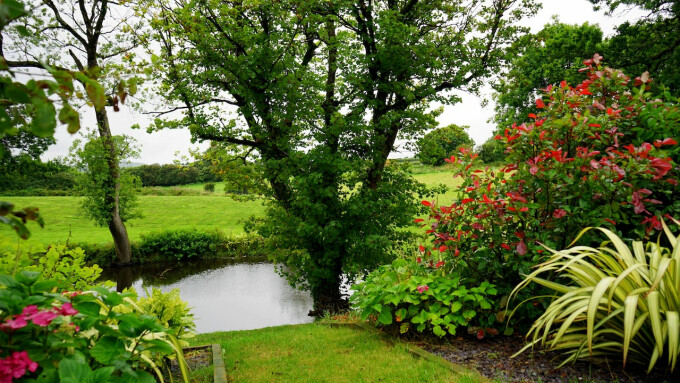The Biblical Narrative: Fall

BY AUSTIN HESS, Pastoral Intern for Oakwood Presbyterian
Biblical Narrative / Genesis 3
Have you ever messed up? Have I got a story for you!
In my previous role as an instructional technologist, I had a lot of technical responsibilities. One of those responsibilities was to double-check that everything was working properly before an online course started. This repetitive task became second nature, and it was easy to drone through dozens and dozens of courses at a time, clicking away mindlessly.
One morning, I got a wake-up call. I received an email that a course had a broken link that needed to be fixed. As I began clicking through the course, which was in its first week of class, I went to click on the link resolver, which just happened to hover right above the “Delete this course” button.
Guess which one I clicked?
Panicked, I called my boss and our IT manager to see what could be done to recover the course and student data. I definitely thought I was getting fired for this one.
Thankfully, none of the students had participated in the course, and we were able to recover all the data. (For whatever reason, to this day, the link resolver still sits above the “Delete this course” button.)
Because of sin, I had become careless in my work to fix issues. Because of my misery, I suffered emotional distress when I was unsure if we could recover important student data. The Westminster Shorter Catechism (WSC 20) tells us that we all ultimately find the roots of our sin and misery in the fall of our first parents, Adam and Eve, in Genesis 3.[1] This post will explore the fall and how sin and misery impact our reading of Scripture and our life together.
Reading the Fall
We all like reading about the creation account in Genesis 1-2—heaven and earth were together. But we hate reading about the fall in Genesis 3 where heaven and earth are torn asunder. I mean, it barely took us two chapters before we messed something up in God’s good creation.
While the details are minimal, at some point after God created all things, Satan and an army of angels rebelled against God and were punished for their sin (cf. Isaiah 14:12-15 to Luke 10:18 and Revelation 12:7-9). As a result, he actively worked to undo the goodness in God’s creation by tempting God’s growing creation to do the very same thing: rebel. He cast doubt in Eve’s heart (Genesis 3:1) and he outright denied God’s Word (Genesis 3:4). Eve ate of the tree of the knowledge of good and evil and gave it to Adam (Genesis 3:6). The one prohibitionary command given by God to them in Genesis 2:16-17 was broken.
As a result, they are now sinful and experience misery. They hid from God (Genesis 3:7). They “lost communion with God, are under his wrath and curse, and [...] liable to all the miseries of this life, to death itself, and to the pains of hell forever” (WSC 19). God cursed them for their disobedience. Rather than enjoying the covenant blessings of union with God, they suffer under His covenant curses and experience a fractured relationship with Him.
The final blow was that they could no longer live in the Garden God had created for them. They had to live as exiles in a world that was foreign and hostile to them and attempt to cultivate its potential.
Life in the Fall
The effects of the fall that Adam and Eve experienced are the same ones we cause today.
We cause division in our community. Rather than enjoying the union we have with Jesus and thereby with each other, we malign, gossip, hate, and attack each other. We’re drained emotionally, physically, and spiritually. We’re anxious, uncertain, and paralyzed by fear. We work harder and harder, always scrapping by. We rebel against God and his ordained authority, or we’re rebelled against. We follow other gods and leaders, looking for salvation. We experience death, disease, and illness. We see death coming from afar or it visits us quickly. Diseases seem to come at us harder and harder, with more sinister symptoms and longer-lasting effects.
Because of the fall, we do not experience communion with God and life together as God intended. We’re still wandering, looking for our eternal home. We’re looking for eternal peace and deliverance from our sin and misery.
Where Do We Go from Here?
This is not the end of the story. Although it’s not an attractive topic, we need to discuss it and think about it. God did not just leave his creation to burn out from all this death and decay.
As we’ll learn in the final post, God did not leave us to perish in this estate of sin and misery. Rather, as WSC 20 proclaims, God worked “to deliver them [us] out of the estate of sin and misery and to bring them [us] into an estate of salvation by a Redeemer.”
Resources for Further Study
- Kapic, Kelly M. Embodied Hope: A Theological Meditation on Pain and Suffering. Downers Grove: IVP Academic, 2017. Written by the professor of theological studies at Covenant College, Kelly explores pain and suffering in the Christian life as he faces his wife’s cancer diagnosis.
- Plantinga, Cornelius. Not the Way It’s Supposed to Be: A Breviary of Sin. Grand Rapids: William B. Eerdmans Publishing Company, 1995. I cannot think of a better treatment of sin than what Cornelius offers. He helpfully dissects the anatomy of sin and its impact on our life and creation.
Endnotes
[^1]: There is a vast theological debate as to federal headship and the procession of sin. Rather than diving into it in this post, I’m assuming that because Adam is our federal head, when he sinned, we fell with him and sin is transmitted to each and every one of us (WSC 18).
